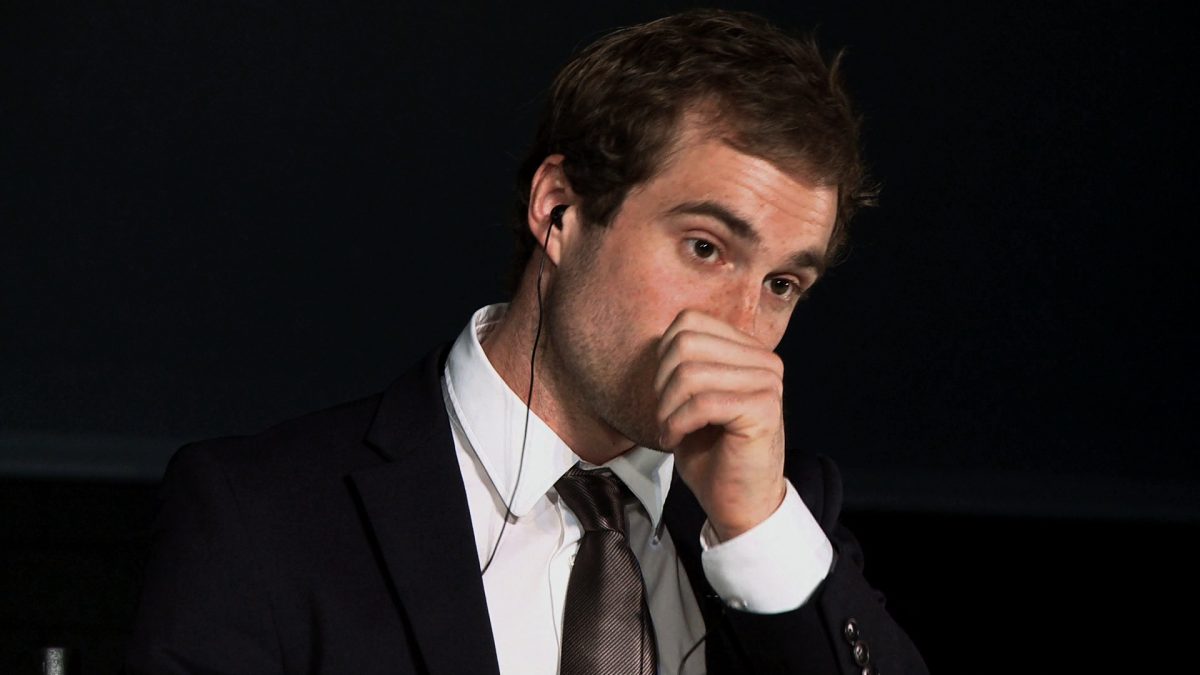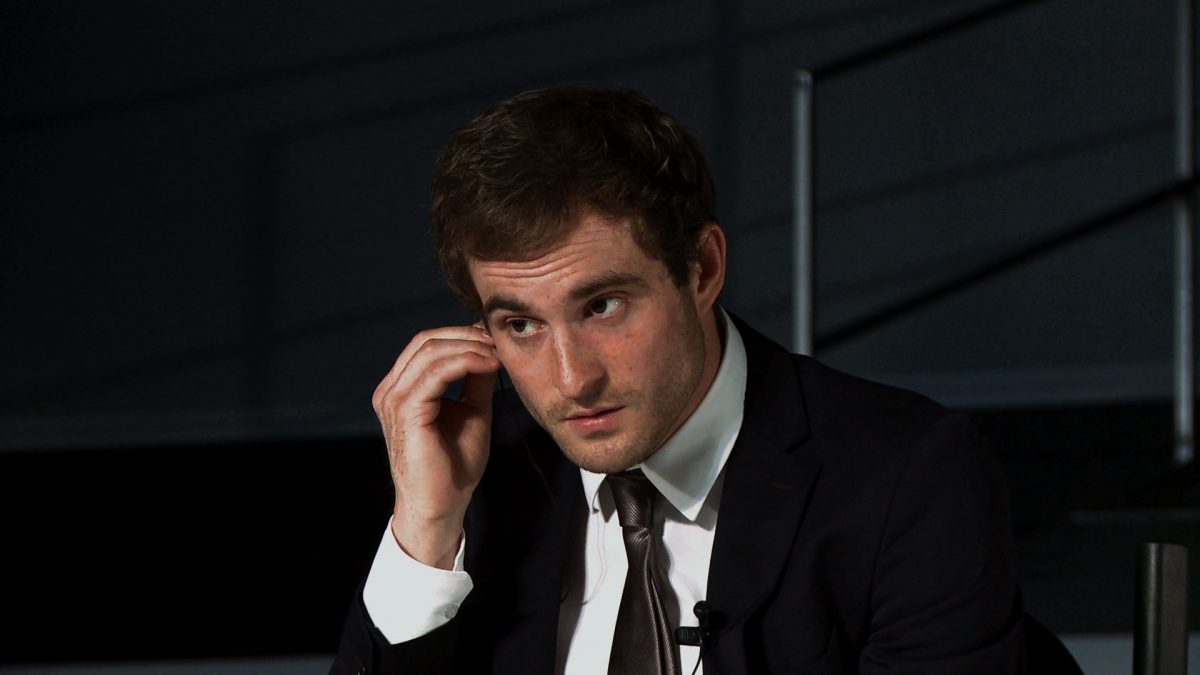Installation / 1 Canal vidéo / Casques d’écoute / Photographie / 25min. / 2015
Lors des célébrations du centième anniversaire des forces aériennes suisses, la « Air 14 », j’ai mené un entretien avec l’un des collaborateurs de Pilatus Aircraft. Sur la base d’un commun accord, il m’a livré un certain nombre d’avis personnels. Cette entreprise aéronautique peut être considérée comme véritable « symbole » de la politique suisse en matière d’exportation et d’opérationnalisation de matériel de guerre. Depuis les années 70, cette politique a régulièrement fait l’objet de critiques tant nationales qu’internationales.
Suite à l’entretien filmé, qui – sans surprise – ne m’a fourni aucune nouvelle information sur la politique d’exportation du groupe, j’ai reçu un sms de la part de mon interlocuteur chez Pilatus:
« Bonjour Madame Loeffel. Je vous prie de traiter de manière confidentielle l’enregistrement que vous avez fait de moi aujourd’hui et je compte sur votre discrétion. Cordiales salutations »
Ce message constitue le point de départ de « Fassung #1 ».
Selon différentes sources au sein du monde suisse des journalistes économiques, l’on pourrait soupçonner que ce type de mandat de silence, de censure, n’a peut être rien d’une coïncidence. Il s’agirait plutôt d’une méthode en partie intériorisée dans le monde économique qui peut trouver son application notamment auprès des journalistes économiques critiques (souvent tenus et développés en vertu de Loi fédérale contre la concurrence déloyale / LCD).
J’ai par la suite transposé cet entretien dans un théâtre, sur une scène vide, le public est absent. Sur la scène, qui elle aussi est un espace de langage rhétorique, l’on trouve un acteur, assis en face d’un écran qui montre l’entretien original. L’acteur a pour mission de transposer la langue que parle la personne filmée en bon allemand (Hochdeutsch). En même temps, il doit transmettre la gestuelle et le langage corporel du collaborateur de Pilatus, dont il devient pour ainsi dire la copie. Ce processus de dédoublement provoque des émotions chez l’acteur, du stress, des moments d’interruption lors desquels l’on voit et l’on entend l’échec du langage, l’échec de la traduction.
Ainsi, cette technique de « l’imitation », qui compte parmi les bases du travail d’acteur, m’aide à mettre en exergue l’utilisation du langage par le biais de la copie et de la simulation. L’objectif de la traduction et du transfert de l’interview vers des espaces de langage autres est finalement de créer une distance – une distance qui permet éventuellement de soulever des questions quant aux conditions dans lesquelles évoluent le langage et les rapports de pouvoir.
La vidéo est présentée sur un écran équipé d’écouteurs. Une photographie du message sms est accrochée à côté de l’écran.
Filmé au Stadttheater de Berne, Vidmarhalle.
Avec le soutien de Pro Helvetia et du Konzert Theater de Berne.
Installation / 1 Kanal Video / Kopfhörer / Fotografie / 25min. / 2015
An der 100 Jahr Feier der Schweizer Luftwaffe „Air14“ habe ich ein Interview mit einem Mitarbeiter der Pilatus Flugzeugwerke geführt, der mir, in gegenseitigem Einverständnis, einige seiner persönlichen Standpunkte unterbreitete. Die Pilatus Flugzeugwerke kann man als ein „Symbol“ der Schweizer Politik von Kriegsmaterialexport und deren Anwendung bezeichnen. Eine Politik, die ab den 70er Jahren regelmässig für nationale und internationale Kritik sorgt.
Nach dem gefilmten Interview, das mir wie erwartet keine neuen Informationen zu der Exportpolitik der Firma lieferte, erhielt ich eine SMS vom Pilatus-Interviewpartner:
„Grüezi Frau Loeffel. Ich bitte sie, die heute von mir gemachten Aufnahmen vertraulich zu behandeln und zähle auf ihre Diskretion. Beste Grüsse“
Diese Nachricht gründet die Ausgangslage von „Fassung #1“.
Nach verschiedenen Quellen aus dem Schweizer Wirtschaftsjournalismus ist zu vermuten, dass solch ein Auftrag an das Schweigen, an Zensur, nicht zufällig ist sondern vielmehr eine im Wirtschaftsbereich zum Teil verinnerlichte Methode frei legt, die vor allem gegenüber dem kritischen Journalismus angewendet wird (oftmals entwickelt und fundiert auf das „Bundesgesetz gegen den unlauteren Wettbewerb / UWG“). Diese Kurznachricht stellt mir somit auch eine sprachliche Zusammenfassung der aktiven Machtverhältnisse im Informationsraum dar.
Die Weiterverarbeitung des gefilmten Interviews setze ich im Theaterraum, auf der leeren Theaterbühne mit fehlendem Publikum, fort. Auf dieser Bühne, auch ein Raum der Rhetorik, sitzt ein Schauspieler dem Originalinterview auf Bildschirm gegenüber, und stellt sich dem Versuch, diesen gefilmten Pilatus-Mitarbeiter direkt und genauestens wieder zu verkörpern. Der Auftrag an den Schauspieler ist es, die Sprache der gefilmten Person direkt in die Hochdeutsche Sprache zu übertragen und die Körpersprache und Gestik zeitgleich zu übermitteln, so zu sagen die Kopie des Pilatus-Mitarbeiters zu werden. Dieser Prozess des direkten Verdoppelns erzeugt beim Schauspieler verschiedene Stresssituationen, Momente der Störungen in denen das Scheitern der Sprache, der Übersetzung sichtbar und hörbar wird.
Somit dient mir diese Technik der „Imitation“, die zu einer Grundlage der Schauspielerei zählt, dazu Sprachgebrauch durch das Verfahren des Kopierens und Simulierens frei zu legen. Mithilfe dieser Über-und Versetzung des gefilmten Interviews in verfremdende Sprachräume, sollte nun eine Distanz zum Inhalt erzeugt werden, die Fragen über Bedingungen von Sprache und Machtverhältnissen ermöglichen kann.
Das Video wird auf einem Bildschirm und mit Kopfhörern präsentiert. Neben dem Bildschirm ist die Fotografie der SMS gehängt.
Gefilmt im Stadttheater Bern, Vidmarhalle.
Unterstützt von Pro Helvetia und Konzert Theater Bern.
Installation / Single channel video / Headphones / Photo / 25min. / 2015
At the 100th anniversary celebrations of the Swiss Air Force “Air 14”, I staged an interview with one of the employees of Pilatus Aircraft. Upon a common agreement, he exposed some of his personal positions to me. Pilatus Aircraft is a company that may be qualified as a symbol of Swiss politics with regard to war material exports and applications – politics that have been regularly criticized, both nationally and internationally, since the 1970’s.
Shortly after the interview, which was recorded on video, and which quite unsurprisingly didn’t yield any new information whatsoever on the company’s export strategy, I received a text message from my interview partner at Pilatus:
“Hello Mrs Loeffel. I kindly ask you to keep any recording you made of me during the interview confidential and I trust in your discretion. Best regards.”
That text message is the point of departure for the realization of “Fassung #1”.
After having consulted with several business journalists in Switzerland, it could be supposed that such mandate to remain silent, such censorship, may not merely be a coincidence. Rather, it could be considered as a partially internalised method in the world of business, especially targeting critical journalists (often based on and elaborated in conjunction with the Swiss Federal Unfair Competition Law/ UWG, UCA).
I then transposed this filmed interview in a theater, on an empty stage, in the absence of an audience, a stage also being a space of rhetorics. There is an actor on the stage, he sits in front of a screen and watches the original interview. He attempts to imitate the interviewee as faithfully as possible. His task is to translate the Pilatus employee’s words from Swiss German into high German and to reproduce his gestures and body language – he has to be that person. This process of direct duplication induces various emotions in the actor, stress as well as disruptive moments where we can see and hear the failure of language and translation.
This imitation technique, one of the most basic methods in drama, allows for the observation of language use through copying and simulating. Thanks to the translation and transfer of the recorded interview into another linguistic space, we are able to build up some distance to the actual content, which in turn possibly allows for a questioning of the circumstances which language and power relations evolve in.
The video is being presented on a screen equipped with headphones. A photograph of the text message hangs beside the screen.
Filmed at the Stadttheater in Bern, Vidmarhalle.
With the support of Pro Helvetia und Konzert Theater Bern.








